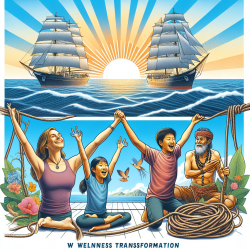Exploring the Health Benefits of Ocean Voyaging
In the realm of speech-language pathology and therapeutic practices, innovative approaches are continually sought to enhance the well-being of children and communities. One such innovative approach is highlighted in the study titled Qualitative study on voyaging and health: perspectives and insights from the medical officers during the Worldwide Voyage. This study delves into the potential health benefits of traditional Polynesian ocean voyaging, offering valuable insights for practitioners aiming to improve their skills and outcomes.
The Study: An Overview
Conducted between 2014 and 2017, the Worldwide Voyage (WWV) embarked from Hawai’i on the traditional voyaging canoe, Hōkūleʻa. The voyage utilized non-instrument navigation methods known as 'wayfinding,' powered solely by natural forces. This study involved medical officers (MOs) who participated in the voyage, providing a unique perspective on the health benefits of this cultural practice.
Key Findings and Themes
The study identified four major themes that suggest ocean voyaging aboard a traditional canoe positively impacts health and well-being:
- Relationships: The voyage fostered strong, positive relationships among crew members and communities, contributing to a sense of safety and belonging.
- Preventive Care to Enhance Health: The physical demands of voyaging, combined with traditional and allopathic medical care, enhanced overall health.
- Holistic Health and Wellbeing: Participants experienced improvements in physical, mental, emotional, and spiritual health, with effects lasting beyond the voyage.
- Spiritual Transformative Experience: The voyage provided profound personal insights and a deeper connection to nature and cultural heritage.
Implications for Practitioners
For practitioners in speech-language pathology and related fields, this study offers several implications:
- Holistic Approaches: Consider incorporating cultural and holistic practices into therapeutic interventions to enhance overall well-being.
- Community and Relationships: Foster strong relationships within therapy groups and communities to improve outcomes.
- Preventive Care: Emphasize preventive care and physical activity as part of a comprehensive therapeutic approach.
- Encourage Exploration: Encourage further research into cultural practices and their potential health benefits.
By integrating these insights, practitioners can enhance their skills and create more effective, culturally sensitive interventions that resonate with children and communities.
To read the original research paper, please follow this link: Qualitative study on voyaging and health: perspectives and insights from the medical officers during the Worldwide Voyage.










